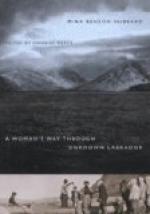CHAPTER XV
THE MONTAGNAIS INDIANS
The night was very still when I awoke, but it was cold. Frost sparkled in the moonlight on willows and low growth, and when at first sign of dawn I reached for my stockings and duffel to put them on, they were frozen stiff. I did not wait to hunt out dry ones, but slipped them on for I was too anxious to be on the march again. I meant to go on to Ungava now, no matter what befell; perhaps we could yet be in time for the ship. She might be delayed.
The men were astir early, and at a quarter to six we were off. Already the lake was almost too rough again to go forward. The wind had risen, and blew cold across the water driving the morning mists before it. Now and then they lifted a little, giving a glimpse of the farther shore, or parted overhead where a patch of deep blue could be seen. It was rather shivery, but I loved it. Two hours later the mists were gone, and for the first time since leaving Lake Hubbard we saw the sun again.
It was a glorious day, the kind which almost all the eventful days of our journey had been. I wanted to compel it to yield me something of value and interest, and it did; for after we had passed down the stretch of river below Long Lake and out into the larger one which I afterwards named Resolution, we came upon the first camp of the Indians.
When we entered the lake we were surrounded by numbers of islands in its upper extremity, but beyond it was clear and stretched away northward calm and beautiful after the storm. Its shores were low for the most part, but four miles down the lake a high, sandy point reached far out from the east shore, and it was there we found the Indians.
At first, we could see only a shapeless dark mass on the hillside. It moved and swayed now this way, now that, and the first thought was that it was caribou; but when there came the flash of sunlight on metal from the midst of it, and the sound of rifle shots, there was no longer any mistaking it for caribou.
As we came towards them the firing continued at intervals, and now and then I sent back an answering shot from my revolver; but it was not without a feeling of uneasiness that we approached. I thought of many things which might happen and the men paddled very slowly; but our amusement may be imagined when, on drawing nearer, we found that they were all women and children. There was much screaming and shouting from the hill.
“Go away, go away,” they shrieked. “We are afraid of you. Our husbands are away.”
Their speech was that of the Montagnais Indians which George understood, having learned to speak it while at Northwest River post in the winter of 1903-1904.
“Tanta sebo?” (Where is the river?) shouted Job into the din, “Tanta sebo?”
When they ceased their screaming to listen, George called to them in Montagnais: “We are strangers and are passing through your country.”




